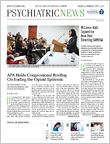Burnout is a growing public health care crisis, affecting not only health care professionals themselves, but the overall health care system as well. That’s the opinion of 10 CEOs of health care organizations who addressed the issue in a Health Affairs blog posted March 28. This report was a result of a summit meeting at AMA headquarters in September 2016, during which the attendees concluded that physician burnout has become an issue of national importance.
The issue is also of growing concern in the psychiatric community as international research has consistently shown that psychiatrists report greater burnout than other physicians. A study published a decade ago in World Psychiatry noted that psychiatrists are more vulnerable to burnout than other physicians and surgeons due to such factors as patient violence and suicide, limited resources, overcrowded inpatient settings, changing culture in mental health services, and isolation.
The authors of the Health Affairs blog noted that the increase in physician burnout—with its accompanying emotional exhaustion, depersonalization, and feelings of low achievement and decreased effectiveness—is not related to shortcomings on the part of physicians; indeed, the authors cited the rigorous selection process that weeds out those unable or unwilling to accept the demands of the profession, the overall altruistic nature of most physicians, and the training that teaches them to accept the challenges inherent in the health care field.
Rather, they wrote, the higher burnout rates can be linked to “loss of control over work, increased performance measurement, increasing complexity of medical care, implementation of electronic health records, and inefficiencies in the practice environment.” Taken together, these factors have significantly changed the landscape of the health care profession, altering workflows and patient interactions. The result, the authors observed, is that many physicians who were previously engaged in their work have reached levels of burnout that are leading to early retirement, less time devoted to clinical work, or leaving the profession altogether.
Physician burnout also has a profound effect on patient safety, quality of care, and health care costs, in ways both direct (for example, turnover, early retirement, curtailment of work hours) and indirect (for example, poor quality of care, including medication and other errors; unnecessary testing and referrals; increased risk of malpractice; and the possibility of higher hospital admissions/readmissions).
“The high level of burnout among physicians should be considered an early warning sign of dysfunction in our health care system,” the authors wrote. “Professional satisfaction for physicians is primarily driven by the ability to provide high-quality care to patients in an efficient manner. Dissatisfaction is driven by factors that impede this effort, including administrative and regulatory burdens, limitations of current technology, an inefficient practice environment, excessive clerical work, and conflicting payer requirements.”
Burnout is more common among physicians than other workers in the United States and that disparity is growing, reported the authors. They cited the recent commitments of their respective organizations to reducing physician burnout, which included the following:
•
Assessing and reporting on physician well-being.
•
Evaluating and tracking institutional costs pertaining to physician turnover, early retirement, and lowered clinical effort.
•
Supporting team-based models of care where skills that do not require the unique training of the physician can be managed by other team members.
•
Encouraging government and regulatory agencies to address the increasing regulatory burden responsible for inefficiency, redundancy, and health care waste.
•
Encouraging and supporting the AMA to develop further initiatives by sharing best practices from institutions that have successfully begun to address burnout.
APA recognizes the toll of physician burnout and is committed to promoting the well-being of psychiatrists.
APA President-elect Anita Everett, M.D., will chair “Physician Wellness and Burnout: A Town Hall Discussion With APA Leadership” at this year’s Annual Meeting later this month in San Diego. (Register now if you have not done so already—see end of article.) Also joining in the town hall discussion will be APA CEO and Medical Director Saul Levin, M.D., M.P.A., and Trustee-at-Large Richard Summers, M.D. Everett recently appointed Summers to chair the Work Group on Psychiatrist Well-Being and Burnout during her presidential year.
“APA leadership wants to hear from members regarding drivers of burnout, strategies for promoting wellness, and factors that contribute to professional satisfaction,” Summers told Psychiatric News. “My hope for the work group going forward is that we will review what we know about psychiatrist well-being and burnout and provide educational materials, self-assessment tools, and potential interventions for our members.” ■
“Physician Burnout Is a Public Health Crisis: A Message to Our Fellow Health Care CEOs” can be accessed
here. Registration information for APA’s Annual Meeting is available
here.

